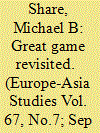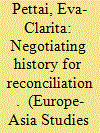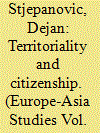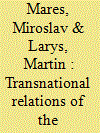| Srl | Item |
| 1 |
ID:
141274


|
|
|
|
|
| Summary/Abstract |
During the second half of the nineteenth century, British and Russians fought, sometimes violently, in an Asian front that ranged from the Caucasus Mountains to the west to China's Xinjiang Province to the east. This rivalry, known as the Great Game, nearly erupted into a full-scale war in 1885. Following the Russian Revolution and Civil War, the rivalry between the Soviet Union and Great Britain re-emerged. This article describes the Anglo–Soviet rivalry in troubled, war-torn Xinjiang during the 1920s and 1930s, a time when Britain was a declining power and the Soviet Union a new ascendant power.
|
|
|
|
|
|
|
|
|
|
|
|
|
|
|
|
| 2 |
ID:
141273


|
|
|
|
|
| Summary/Abstract |
This article discusses the presidential historical commissions of Estonia, Latvia and Lithuania that were established in 1998 to research the crimes of the Nazi and Soviet totalitarian regimes and to overcome interpretive disputes that had begun to overshadow the new democracies' politics. Conceptually framed as a state tool of historical conflict resolution and reconciliation, the Baltic commissions' structure, operative work and results all reveal many of the pitfalls, but also the opportunities of such official bodies of historical truth-seeking. The article concludes that even though all three commissions had a clear reconciliatory aim, their operative processes and final output differed remarkably. Their contribution to actual reconciliation was also very limited.
|
|
|
|
|
|
|
|
|
|
|
|
|
|
|
|
| 3 |
ID:
141271


|
|
|
|
|
| Summary/Abstract |
This article deals with the issue of sub-state citizenship in the post-Yugoslav countries and focuses on the emergence and definitions of membership. The article analyses conceptions of nationhood and territorial compositions of the states, proceeds with the analysis of sub-state entities' governance arrangements and compares conceptions of nationhood and membership in state-wide and sub-state polities. The article identifies four broad categories of sub-state polities and two diverging tendencies in the definition of membership. At one end of the spectrum, there are cases in which membership in regional polities is based on territorial, multi-ethnic and civic principles. At the other end, membership is defined in ethno-national terms.
|
|
|
|
|
|
|
|
|
|
|
|
|
|
|
|
| 4 |
ID:
141272


|
|
|
|
|
| Summary/Abstract |
This article describes and analyses the transnational relations of Russian extreme right entities. It classifies the Russian extreme right into categories according to their ideological orientation (ethnonationalism and civilisational nationalism) and forms of activity (political parties and interest groups, intellectuals, the autonomous neo-Nazi scene, and paramilitary formations). For each category important contacts are described in terms of the travels abroad of Russian extreme right activists, visits by foreign extremists to Russia, and the establishment of transnational organisation branches in Russia. The article concludes that although so far the Russian extreme right has mostly had ad hoc contacts abroad, it has been involved in the gradual building of stable networks.
|
|
|
|
|
|
|
|
|
|
|
|
|
|
|
|